Developing Manager Report: Management Skills, Leadership, and Change
VerifiedAdded on 2020/10/05
|13
|3980
|422
Report
AI Summary
This report, focusing on the developing manager, examines various management styles such as democratic, autocratic, laissez-faire, and transactional approaches, comparing their effectiveness within an organization. It delves into the characteristics of leadership, emphasizing the importance of interpersonal and communication skills, knowledge, self-confidence, and adaptability to changing circumstances. The report also evaluates the communication processes within an organization, highlighting upward, downward, horizontal, and diagonal communication channels. Furthermore, it explores organizational culture and change management, including a SWOT analysis of personal management skills and the development of a career development plan. The report includes an assessment of the author's own management skills, providing insights into strengths and weaknesses. Ultimately, the report aims to provide a comprehensive understanding of the skills and strategies required for effective management and leadership within a dynamic organizational environment.
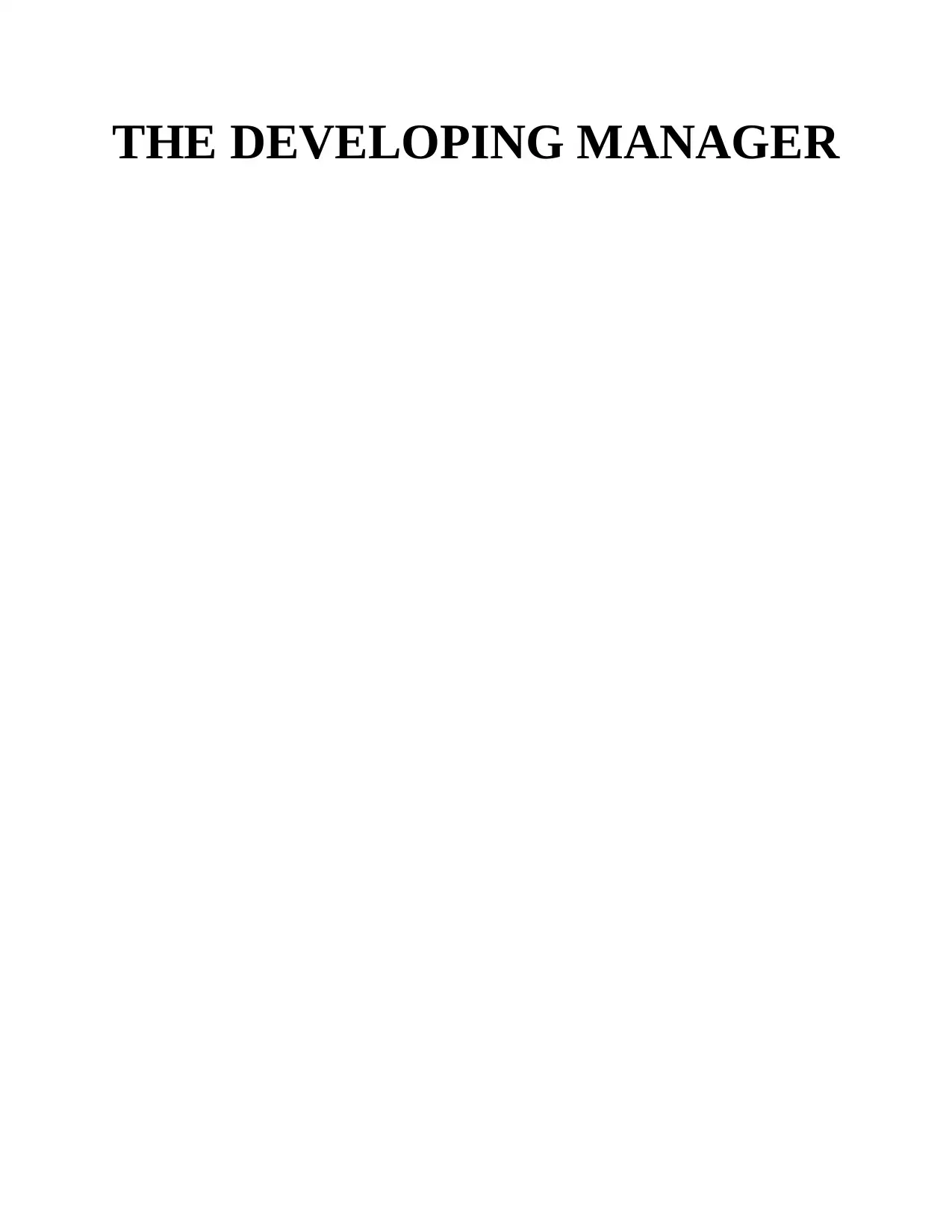
THE DEVELOPING MANAGER
Paraphrase This Document
Need a fresh take? Get an instant paraphrase of this document with our AI Paraphraser
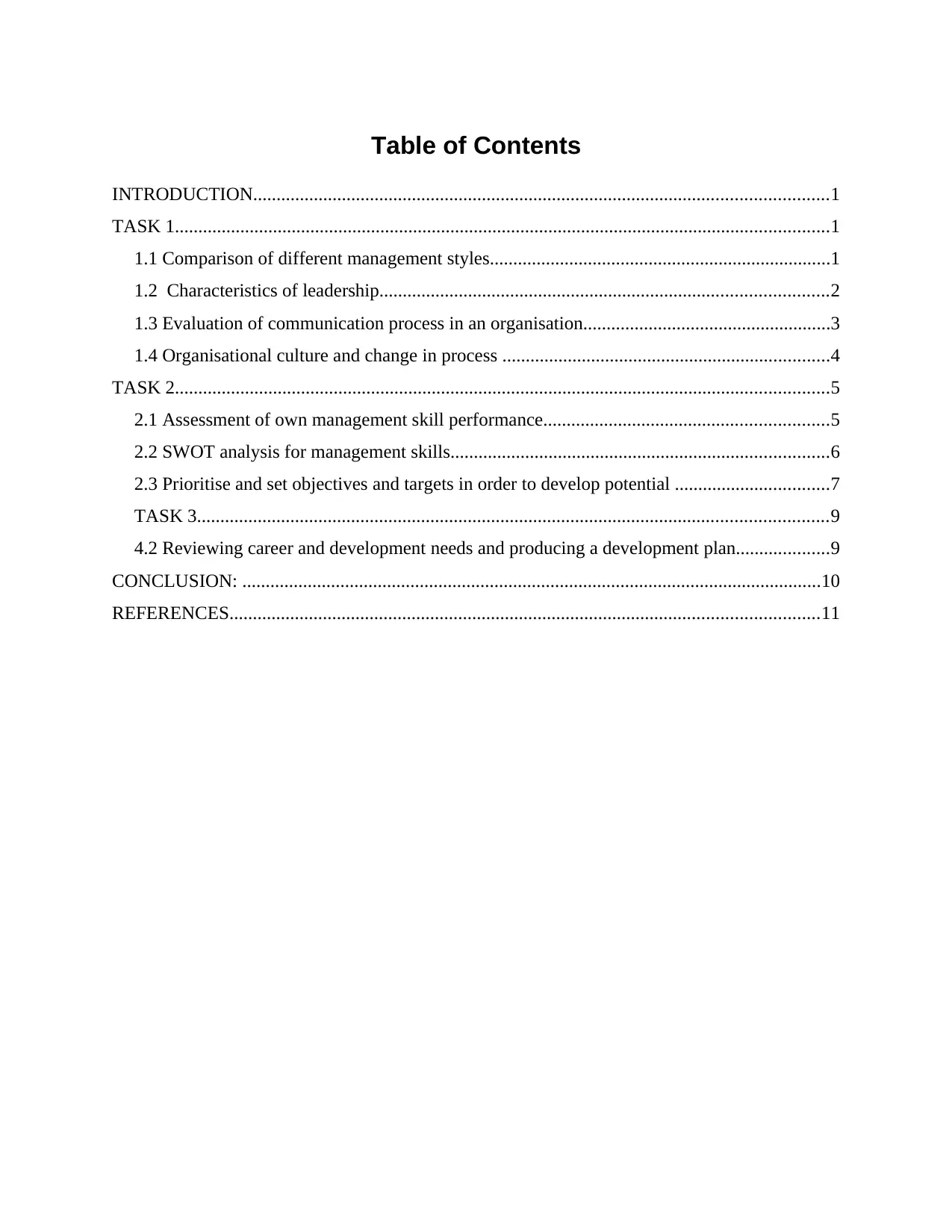
Table of Contents
INTRODUCTION...........................................................................................................................1
TASK 1............................................................................................................................................1
1.1 Comparison of different management styles.........................................................................1
1.2 Characteristics of leadership................................................................................................2
1.3 Evaluation of communication process in an organisation.....................................................3
1.4 Organisational culture and change in process ......................................................................4
TASK 2............................................................................................................................................5
2.1 Assessment of own management skill performance.............................................................5
2.2 SWOT analysis for management skills.................................................................................6
2.3 Prioritise and set objectives and targets in order to develop potential .................................7
TASK 3.......................................................................................................................................9
4.2 Reviewing career and development needs and producing a development plan....................9
CONCLUSION: ............................................................................................................................10
REFERENCES..............................................................................................................................11
INTRODUCTION...........................................................................................................................1
TASK 1............................................................................................................................................1
1.1 Comparison of different management styles.........................................................................1
1.2 Characteristics of leadership................................................................................................2
1.3 Evaluation of communication process in an organisation.....................................................3
1.4 Organisational culture and change in process ......................................................................4
TASK 2............................................................................................................................................5
2.1 Assessment of own management skill performance.............................................................5
2.2 SWOT analysis for management skills.................................................................................6
2.3 Prioritise and set objectives and targets in order to develop potential .................................7
TASK 3.......................................................................................................................................9
4.2 Reviewing career and development needs and producing a development plan....................9
CONCLUSION: ............................................................................................................................10
REFERENCES..............................................................................................................................11
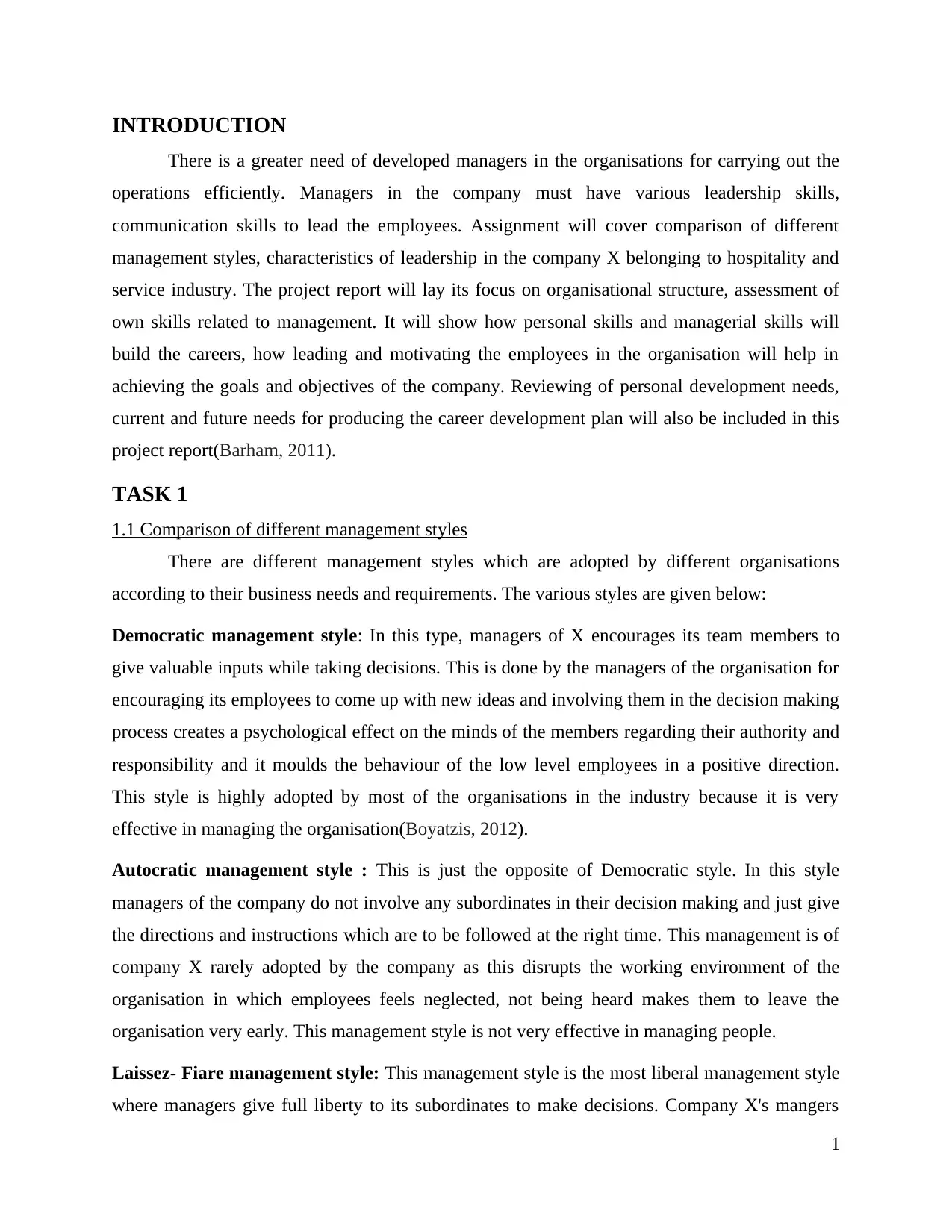
INTRODUCTION
There is a greater need of developed managers in the organisations for carrying out the
operations efficiently. Managers in the company must have various leadership skills,
communication skills to lead the employees. Assignment will cover comparison of different
management styles, characteristics of leadership in the company X belonging to hospitality and
service industry. The project report will lay its focus on organisational structure, assessment of
own skills related to management. It will show how personal skills and managerial skills will
build the careers, how leading and motivating the employees in the organisation will help in
achieving the goals and objectives of the company. Reviewing of personal development needs,
current and future needs for producing the career development plan will also be included in this
project report(Barham, 2011).
TASK 1
1.1 Comparison of different management styles
There are different management styles which are adopted by different organisations
according to their business needs and requirements. The various styles are given below:
Democratic management style: In this type, managers of X encourages its team members to
give valuable inputs while taking decisions. This is done by the managers of the organisation for
encouraging its employees to come up with new ideas and involving them in the decision making
process creates a psychological effect on the minds of the members regarding their authority and
responsibility and it moulds the behaviour of the low level employees in a positive direction.
This style is highly adopted by most of the organisations in the industry because it is very
effective in managing the organisation(Boyatzis, 2012).
Autocratic management style : This is just the opposite of Democratic style. In this style
managers of the company do not involve any subordinates in their decision making and just give
the directions and instructions which are to be followed at the right time. This management is of
company X rarely adopted by the company as this disrupts the working environment of the
organisation in which employees feels neglected, not being heard makes them to leave the
organisation very early. This management style is not very effective in managing people.
Laissez- Fiare management style: This management style is the most liberal management style
where managers give full liberty to its subordinates to make decisions. Company X's mangers
1
There is a greater need of developed managers in the organisations for carrying out the
operations efficiently. Managers in the company must have various leadership skills,
communication skills to lead the employees. Assignment will cover comparison of different
management styles, characteristics of leadership in the company X belonging to hospitality and
service industry. The project report will lay its focus on organisational structure, assessment of
own skills related to management. It will show how personal skills and managerial skills will
build the careers, how leading and motivating the employees in the organisation will help in
achieving the goals and objectives of the company. Reviewing of personal development needs,
current and future needs for producing the career development plan will also be included in this
project report(Barham, 2011).
TASK 1
1.1 Comparison of different management styles
There are different management styles which are adopted by different organisations
according to their business needs and requirements. The various styles are given below:
Democratic management style: In this type, managers of X encourages its team members to
give valuable inputs while taking decisions. This is done by the managers of the organisation for
encouraging its employees to come up with new ideas and involving them in the decision making
process creates a psychological effect on the minds of the members regarding their authority and
responsibility and it moulds the behaviour of the low level employees in a positive direction.
This style is highly adopted by most of the organisations in the industry because it is very
effective in managing the organisation(Boyatzis, 2012).
Autocratic management style : This is just the opposite of Democratic style. In this style
managers of the company do not involve any subordinates in their decision making and just give
the directions and instructions which are to be followed at the right time. This management is of
company X rarely adopted by the company as this disrupts the working environment of the
organisation in which employees feels neglected, not being heard makes them to leave the
organisation very early. This management style is not very effective in managing people.
Laissez- Fiare management style: This management style is the most liberal management style
where managers give full liberty to its subordinates to make decisions. Company X's mangers
1
⊘ This is a preview!⊘
Do you want full access?
Subscribe today to unlock all pages.

Trusted by 1+ million students worldwide
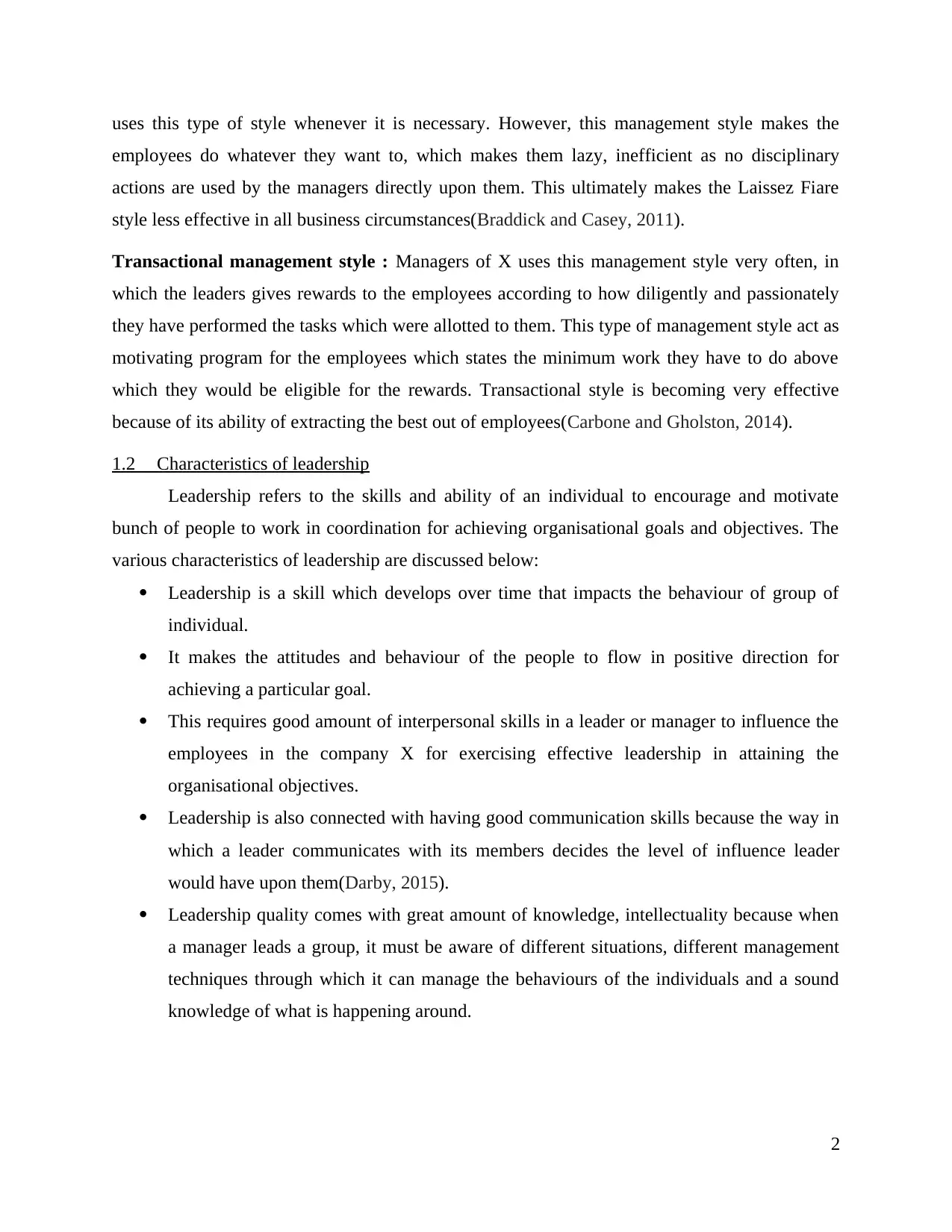
uses this type of style whenever it is necessary. However, this management style makes the
employees do whatever they want to, which makes them lazy, inefficient as no disciplinary
actions are used by the managers directly upon them. This ultimately makes the Laissez Fiare
style less effective in all business circumstances(Braddick and Casey, 2011).
Transactional management style : Managers of X uses this management style very often, in
which the leaders gives rewards to the employees according to how diligently and passionately
they have performed the tasks which were allotted to them. This type of management style act as
motivating program for the employees which states the minimum work they have to do above
which they would be eligible for the rewards. Transactional style is becoming very effective
because of its ability of extracting the best out of employees(Carbone and Gholston, 2014).
1.2 Characteristics of leadership
Leadership refers to the skills and ability of an individual to encourage and motivate
bunch of people to work in coordination for achieving organisational goals and objectives. The
various characteristics of leadership are discussed below:
Leadership is a skill which develops over time that impacts the behaviour of group of
individual.
It makes the attitudes and behaviour of the people to flow in positive direction for
achieving a particular goal.
This requires good amount of interpersonal skills in a leader or manager to influence the
employees in the company X for exercising effective leadership in attaining the
organisational objectives.
Leadership is also connected with having good communication skills because the way in
which a leader communicates with its members decides the level of influence leader
would have upon them(Darby, 2015).
Leadership quality comes with great amount of knowledge, intellectuality because when
a manager leads a group, it must be aware of different situations, different management
techniques through which it can manage the behaviours of the individuals and a sound
knowledge of what is happening around.
2
employees do whatever they want to, which makes them lazy, inefficient as no disciplinary
actions are used by the managers directly upon them. This ultimately makes the Laissez Fiare
style less effective in all business circumstances(Braddick and Casey, 2011).
Transactional management style : Managers of X uses this management style very often, in
which the leaders gives rewards to the employees according to how diligently and passionately
they have performed the tasks which were allotted to them. This type of management style act as
motivating program for the employees which states the minimum work they have to do above
which they would be eligible for the rewards. Transactional style is becoming very effective
because of its ability of extracting the best out of employees(Carbone and Gholston, 2014).
1.2 Characteristics of leadership
Leadership refers to the skills and ability of an individual to encourage and motivate
bunch of people to work in coordination for achieving organisational goals and objectives. The
various characteristics of leadership are discussed below:
Leadership is a skill which develops over time that impacts the behaviour of group of
individual.
It makes the attitudes and behaviour of the people to flow in positive direction for
achieving a particular goal.
This requires good amount of interpersonal skills in a leader or manager to influence the
employees in the company X for exercising effective leadership in attaining the
organisational objectives.
Leadership is also connected with having good communication skills because the way in
which a leader communicates with its members decides the level of influence leader
would have upon them(Darby, 2015).
Leadership quality comes with great amount of knowledge, intellectuality because when
a manager leads a group, it must be aware of different situations, different management
techniques through which it can manage the behaviours of the individuals and a sound
knowledge of what is happening around.
2
Paraphrase This Document
Need a fresh take? Get an instant paraphrase of this document with our AI Paraphraser
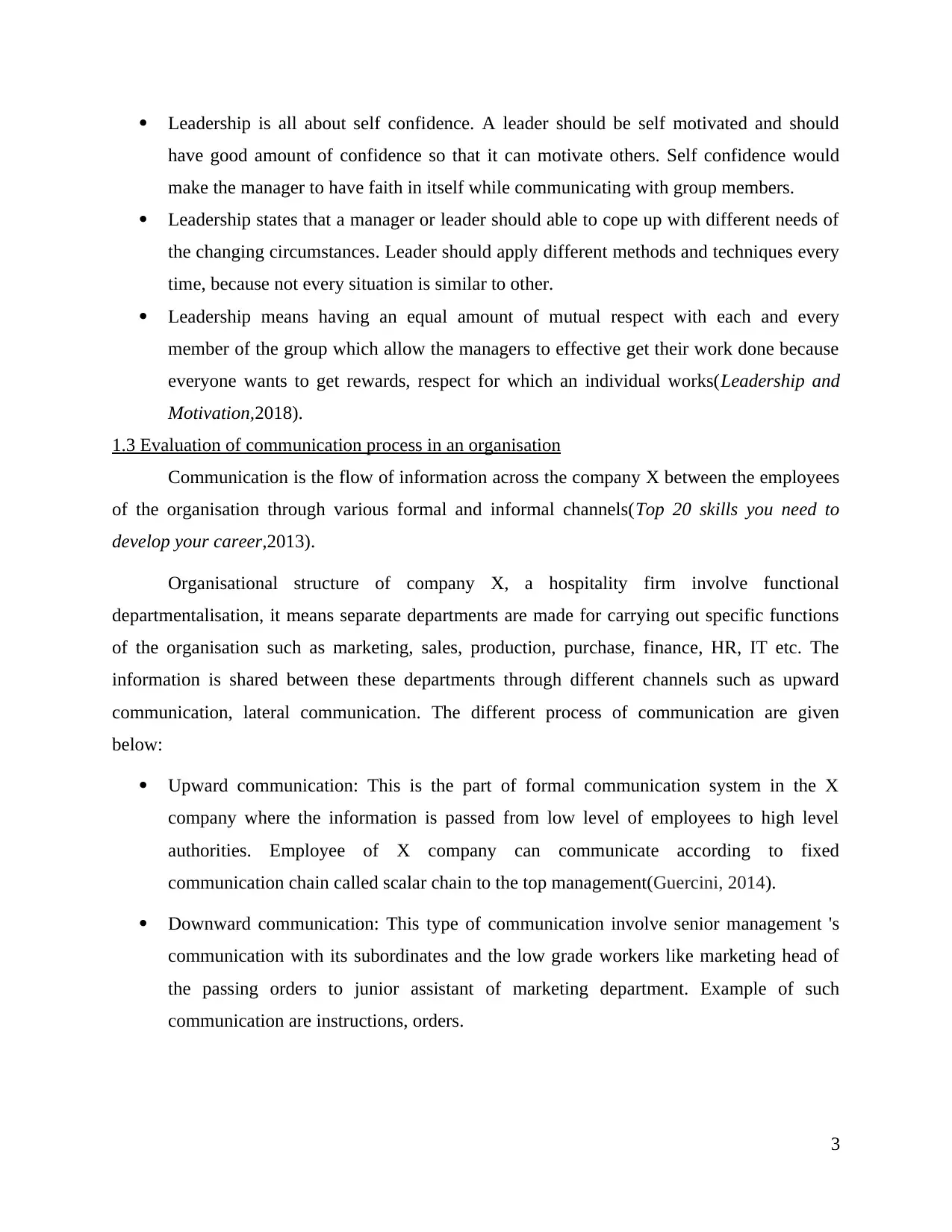
Leadership is all about self confidence. A leader should be self motivated and should
have good amount of confidence so that it can motivate others. Self confidence would
make the manager to have faith in itself while communicating with group members.
Leadership states that a manager or leader should able to cope up with different needs of
the changing circumstances. Leader should apply different methods and techniques every
time, because not every situation is similar to other.
Leadership means having an equal amount of mutual respect with each and every
member of the group which allow the managers to effective get their work done because
everyone wants to get rewards, respect for which an individual works(Leadership and
Motivation,2018).
1.3 Evaluation of communication process in an organisation
Communication is the flow of information across the company X between the employees
of the organisation through various formal and informal channels(Top 20 skills you need to
develop your career,2013).
Organisational structure of company X, a hospitality firm involve functional
departmentalisation, it means separate departments are made for carrying out specific functions
of the organisation such as marketing, sales, production, purchase, finance, HR, IT etc. The
information is shared between these departments through different channels such as upward
communication, lateral communication. The different process of communication are given
below:
Upward communication: This is the part of formal communication system in the X
company where the information is passed from low level of employees to high level
authorities. Employee of X company can communicate according to fixed
communication chain called scalar chain to the top management(Guercini, 2014).
Downward communication: This type of communication involve senior management 's
communication with its subordinates and the low grade workers like marketing head of
the passing orders to junior assistant of marketing department. Example of such
communication are instructions, orders.
3
have good amount of confidence so that it can motivate others. Self confidence would
make the manager to have faith in itself while communicating with group members.
Leadership states that a manager or leader should able to cope up with different needs of
the changing circumstances. Leader should apply different methods and techniques every
time, because not every situation is similar to other.
Leadership means having an equal amount of mutual respect with each and every
member of the group which allow the managers to effective get their work done because
everyone wants to get rewards, respect for which an individual works(Leadership and
Motivation,2018).
1.3 Evaluation of communication process in an organisation
Communication is the flow of information across the company X between the employees
of the organisation through various formal and informal channels(Top 20 skills you need to
develop your career,2013).
Organisational structure of company X, a hospitality firm involve functional
departmentalisation, it means separate departments are made for carrying out specific functions
of the organisation such as marketing, sales, production, purchase, finance, HR, IT etc. The
information is shared between these departments through different channels such as upward
communication, lateral communication. The different process of communication are given
below:
Upward communication: This is the part of formal communication system in the X
company where the information is passed from low level of employees to high level
authorities. Employee of X company can communicate according to fixed
communication chain called scalar chain to the top management(Guercini, 2014).
Downward communication: This type of communication involve senior management 's
communication with its subordinates and the low grade workers like marketing head of
the passing orders to junior assistant of marketing department. Example of such
communication are instructions, orders.
3
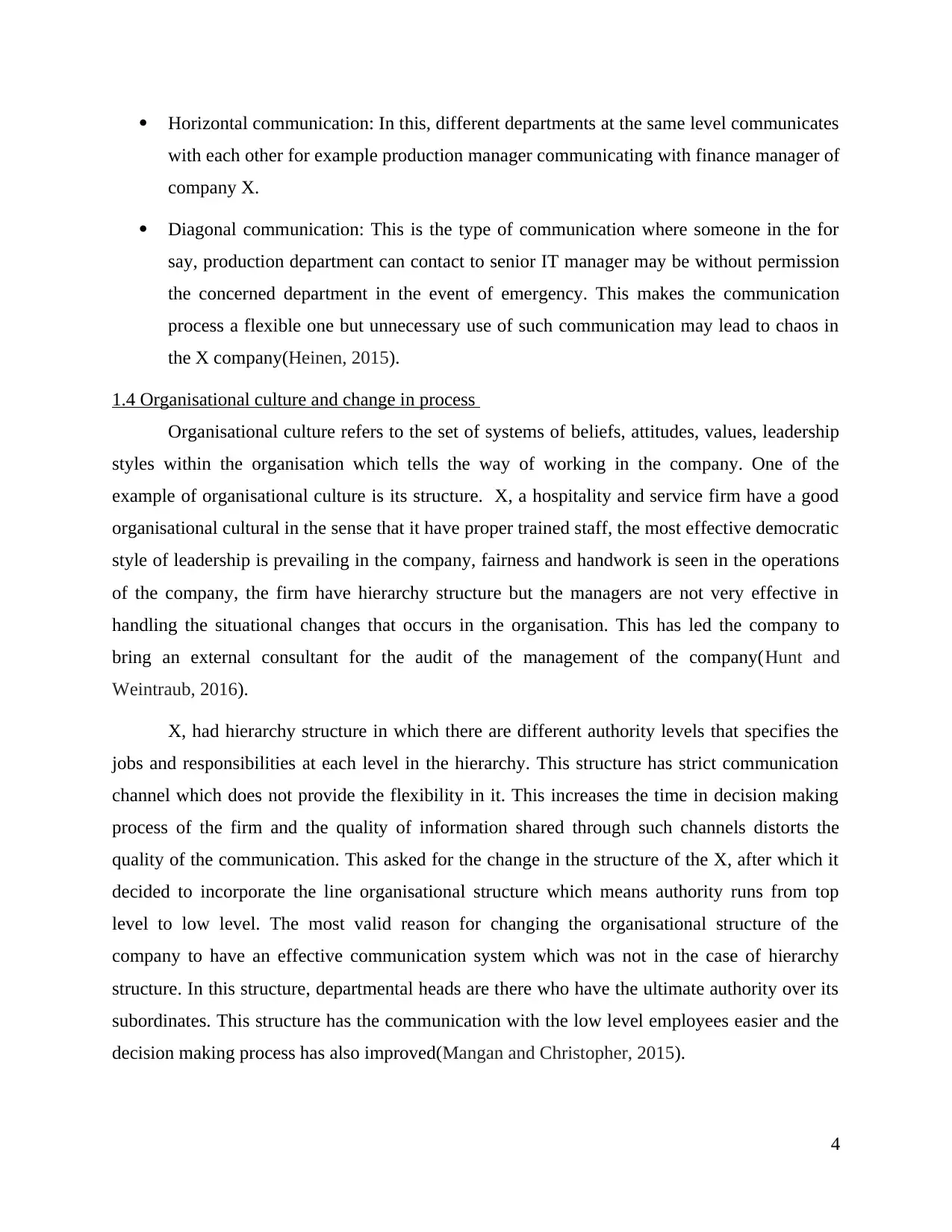
Horizontal communication: In this, different departments at the same level communicates
with each other for example production manager communicating with finance manager of
company X.
Diagonal communication: This is the type of communication where someone in the for
say, production department can contact to senior IT manager may be without permission
the concerned department in the event of emergency. This makes the communication
process a flexible one but unnecessary use of such communication may lead to chaos in
the X company(Heinen, 2015).
1.4 Organisational culture and change in process
Organisational culture refers to the set of systems of beliefs, attitudes, values, leadership
styles within the organisation which tells the way of working in the company. One of the
example of organisational culture is its structure. X, a hospitality and service firm have a good
organisational cultural in the sense that it have proper trained staff, the most effective democratic
style of leadership is prevailing in the company, fairness and handwork is seen in the operations
of the company, the firm have hierarchy structure but the managers are not very effective in
handling the situational changes that occurs in the organisation. This has led the company to
bring an external consultant for the audit of the management of the company(Hunt and
Weintraub, 2016).
X, had hierarchy structure in which there are different authority levels that specifies the
jobs and responsibilities at each level in the hierarchy. This structure has strict communication
channel which does not provide the flexibility in it. This increases the time in decision making
process of the firm and the quality of information shared through such channels distorts the
quality of the communication. This asked for the change in the structure of the X, after which it
decided to incorporate the line organisational structure which means authority runs from top
level to low level. The most valid reason for changing the organisational structure of the
company to have an effective communication system which was not in the case of hierarchy
structure. In this structure, departmental heads are there who have the ultimate authority over its
subordinates. This structure has the communication with the low level employees easier and the
decision making process has also improved(Mangan and Christopher, 2015).
4
with each other for example production manager communicating with finance manager of
company X.
Diagonal communication: This is the type of communication where someone in the for
say, production department can contact to senior IT manager may be without permission
the concerned department in the event of emergency. This makes the communication
process a flexible one but unnecessary use of such communication may lead to chaos in
the X company(Heinen, 2015).
1.4 Organisational culture and change in process
Organisational culture refers to the set of systems of beliefs, attitudes, values, leadership
styles within the organisation which tells the way of working in the company. One of the
example of organisational culture is its structure. X, a hospitality and service firm have a good
organisational cultural in the sense that it have proper trained staff, the most effective democratic
style of leadership is prevailing in the company, fairness and handwork is seen in the operations
of the company, the firm have hierarchy structure but the managers are not very effective in
handling the situational changes that occurs in the organisation. This has led the company to
bring an external consultant for the audit of the management of the company(Hunt and
Weintraub, 2016).
X, had hierarchy structure in which there are different authority levels that specifies the
jobs and responsibilities at each level in the hierarchy. This structure has strict communication
channel which does not provide the flexibility in it. This increases the time in decision making
process of the firm and the quality of information shared through such channels distorts the
quality of the communication. This asked for the change in the structure of the X, after which it
decided to incorporate the line organisational structure which means authority runs from top
level to low level. The most valid reason for changing the organisational structure of the
company to have an effective communication system which was not in the case of hierarchy
structure. In this structure, departmental heads are there who have the ultimate authority over its
subordinates. This structure has the communication with the low level employees easier and the
decision making process has also improved(Mangan and Christopher, 2015).
4
⊘ This is a preview!⊘
Do you want full access?
Subscribe today to unlock all pages.

Trusted by 1+ million students worldwide
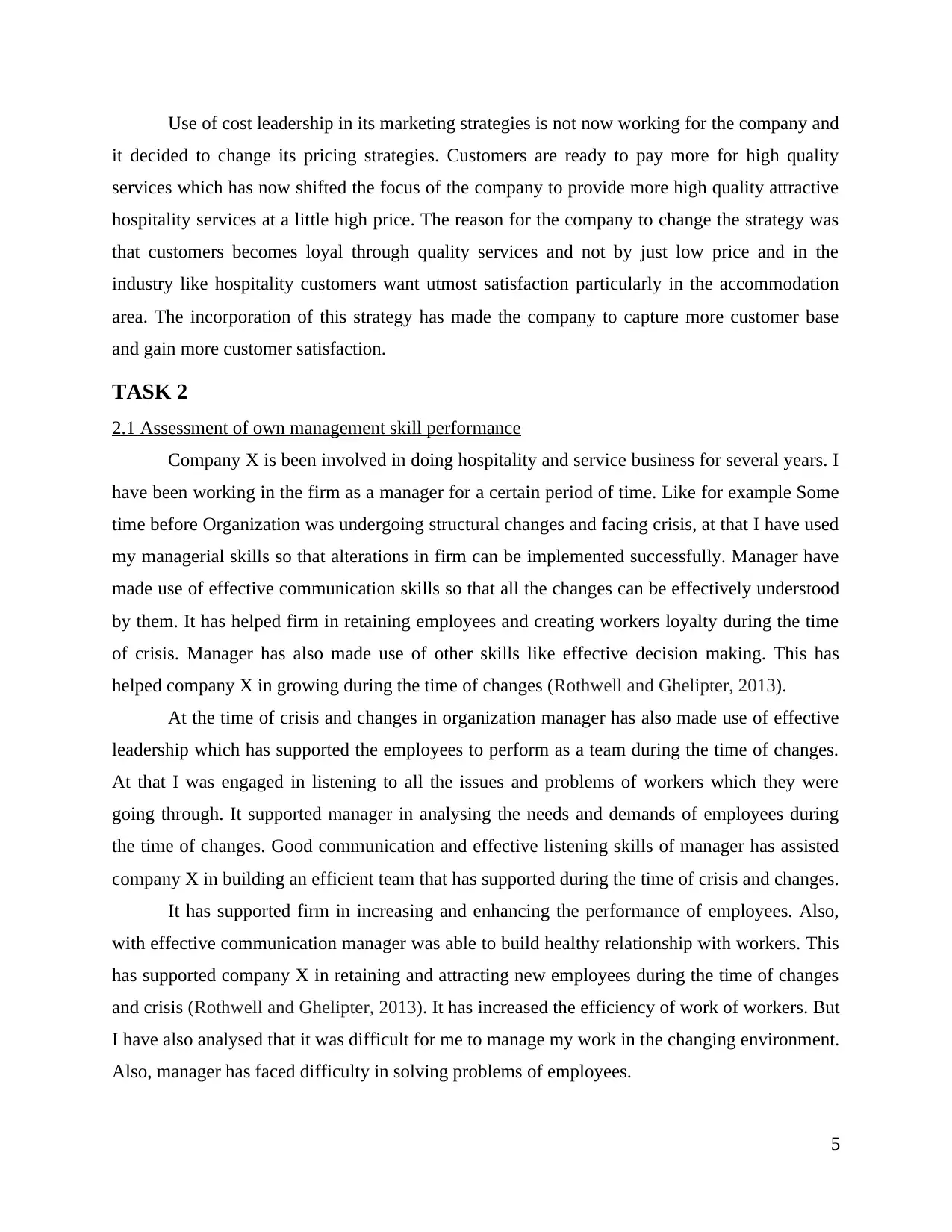
Use of cost leadership in its marketing strategies is not now working for the company and
it decided to change its pricing strategies. Customers are ready to pay more for high quality
services which has now shifted the focus of the company to provide more high quality attractive
hospitality services at a little high price. The reason for the company to change the strategy was
that customers becomes loyal through quality services and not by just low price and in the
industry like hospitality customers want utmost satisfaction particularly in the accommodation
area. The incorporation of this strategy has made the company to capture more customer base
and gain more customer satisfaction.
TASK 2
2.1 Assessment of own management skill performance
Company X is been involved in doing hospitality and service business for several years. I
have been working in the firm as a manager for a certain period of time. Like for example Some
time before Organization was undergoing structural changes and facing crisis, at that I have used
my managerial skills so that alterations in firm can be implemented successfully. Manager have
made use of effective communication skills so that all the changes can be effectively understood
by them. It has helped firm in retaining employees and creating workers loyalty during the time
of crisis. Manager has also made use of other skills like effective decision making. This has
helped company X in growing during the time of changes (Rothwell and Ghelipter, 2013).
At the time of crisis and changes in organization manager has also made use of effective
leadership which has supported the employees to perform as a team during the time of changes.
At that I was engaged in listening to all the issues and problems of workers which they were
going through. It supported manager in analysing the needs and demands of employees during
the time of changes. Good communication and effective listening skills of manager has assisted
company X in building an efficient team that has supported during the time of crisis and changes.
It has supported firm in increasing and enhancing the performance of employees. Also,
with effective communication manager was able to build healthy relationship with workers. This
has supported company X in retaining and attracting new employees during the time of changes
and crisis (Rothwell and Ghelipter, 2013). It has increased the efficiency of work of workers. But
I have also analysed that it was difficult for me to manage my work in the changing environment.
Also, manager has faced difficulty in solving problems of employees.
5
it decided to change its pricing strategies. Customers are ready to pay more for high quality
services which has now shifted the focus of the company to provide more high quality attractive
hospitality services at a little high price. The reason for the company to change the strategy was
that customers becomes loyal through quality services and not by just low price and in the
industry like hospitality customers want utmost satisfaction particularly in the accommodation
area. The incorporation of this strategy has made the company to capture more customer base
and gain more customer satisfaction.
TASK 2
2.1 Assessment of own management skill performance
Company X is been involved in doing hospitality and service business for several years. I
have been working in the firm as a manager for a certain period of time. Like for example Some
time before Organization was undergoing structural changes and facing crisis, at that I have used
my managerial skills so that alterations in firm can be implemented successfully. Manager have
made use of effective communication skills so that all the changes can be effectively understood
by them. It has helped firm in retaining employees and creating workers loyalty during the time
of crisis. Manager has also made use of other skills like effective decision making. This has
helped company X in growing during the time of changes (Rothwell and Ghelipter, 2013).
At the time of crisis and changes in organization manager has also made use of effective
leadership which has supported the employees to perform as a team during the time of changes.
At that I was engaged in listening to all the issues and problems of workers which they were
going through. It supported manager in analysing the needs and demands of employees during
the time of changes. Good communication and effective listening skills of manager has assisted
company X in building an efficient team that has supported during the time of crisis and changes.
It has supported firm in increasing and enhancing the performance of employees. Also,
with effective communication manager was able to build healthy relationship with workers. This
has supported company X in retaining and attracting new employees during the time of changes
and crisis (Rothwell and Ghelipter, 2013). It has increased the efficiency of work of workers. But
I have also analysed that it was difficult for me to manage my work in the changing environment.
Also, manager has faced difficulty in solving problems of employees.
5
Paraphrase This Document
Need a fresh take? Get an instant paraphrase of this document with our AI Paraphraser
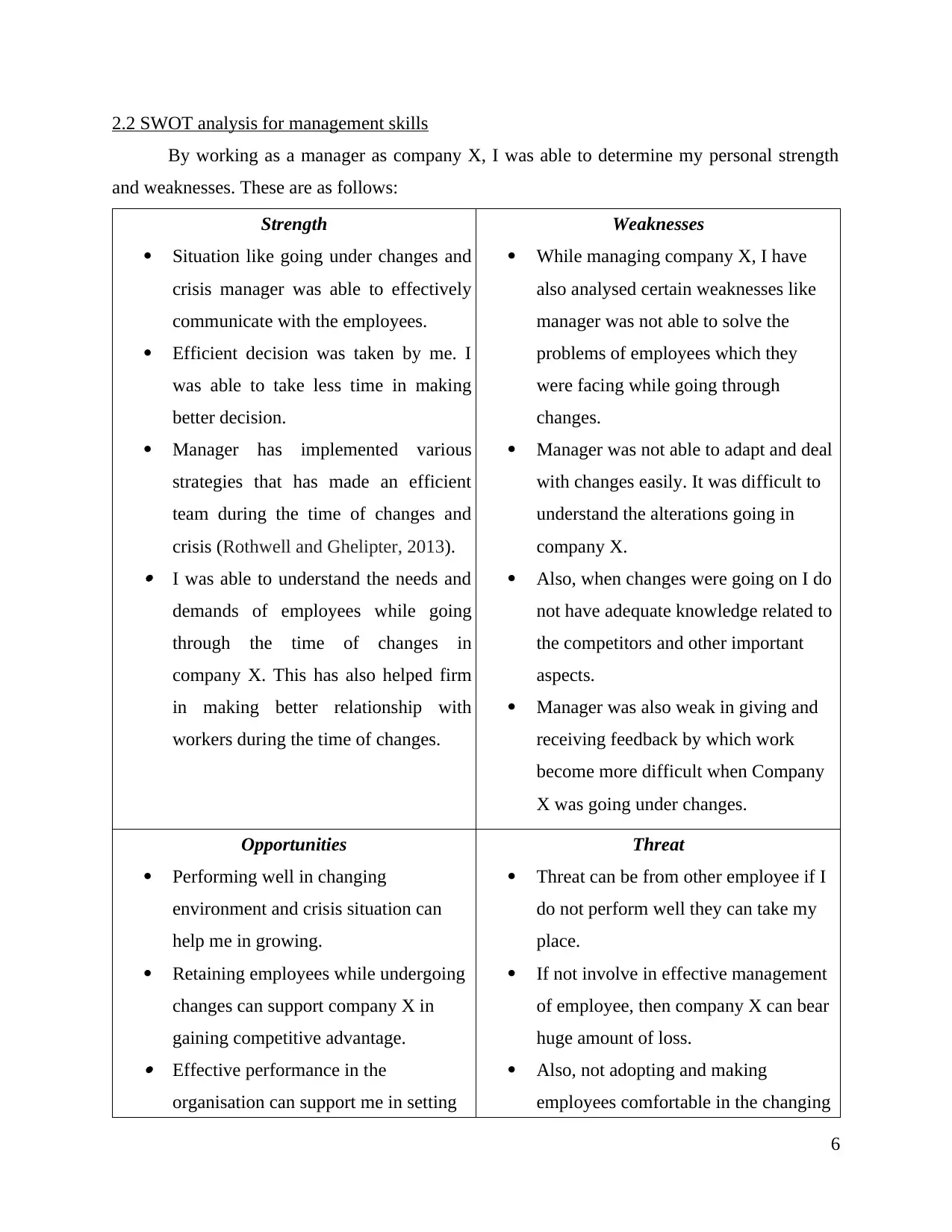
2.2 SWOT analysis for management skills
By working as a manager as company X, I was able to determine my personal strength
and weaknesses. These are as follows:
Strength
Situation like going under changes and
crisis manager was able to effectively
communicate with the employees.
Efficient decision was taken by me. I
was able to take less time in making
better decision.
Manager has implemented various
strategies that has made an efficient
team during the time of changes and
crisis (Rothwell and Ghelipter, 2013). I was able to understand the needs and
demands of employees while going
through the time of changes in
company X. This has also helped firm
in making better relationship with
workers during the time of changes.
Weaknesses
While managing company X, I have
also analysed certain weaknesses like
manager was not able to solve the
problems of employees which they
were facing while going through
changes.
Manager was not able to adapt and deal
with changes easily. It was difficult to
understand the alterations going in
company X.
Also, when changes were going on I do
not have adequate knowledge related to
the competitors and other important
aspects.
Manager was also weak in giving and
receiving feedback by which work
become more difficult when Company
X was going under changes.
Opportunities
Performing well in changing
environment and crisis situation can
help me in growing.
Retaining employees while undergoing
changes can support company X in
gaining competitive advantage. Effective performance in the
organisation can support me in setting
Threat
Threat can be from other employee if I
do not perform well they can take my
place.
If not involve in effective management
of employee, then company X can bear
huge amount of loss.
Also, not adopting and making
employees comfortable in the changing
6
By working as a manager as company X, I was able to determine my personal strength
and weaknesses. These are as follows:
Strength
Situation like going under changes and
crisis manager was able to effectively
communicate with the employees.
Efficient decision was taken by me. I
was able to take less time in making
better decision.
Manager has implemented various
strategies that has made an efficient
team during the time of changes and
crisis (Rothwell and Ghelipter, 2013). I was able to understand the needs and
demands of employees while going
through the time of changes in
company X. This has also helped firm
in making better relationship with
workers during the time of changes.
Weaknesses
While managing company X, I have
also analysed certain weaknesses like
manager was not able to solve the
problems of employees which they
were facing while going through
changes.
Manager was not able to adapt and deal
with changes easily. It was difficult to
understand the alterations going in
company X.
Also, when changes were going on I do
not have adequate knowledge related to
the competitors and other important
aspects.
Manager was also weak in giving and
receiving feedback by which work
become more difficult when Company
X was going under changes.
Opportunities
Performing well in changing
environment and crisis situation can
help me in growing.
Retaining employees while undergoing
changes can support company X in
gaining competitive advantage. Effective performance in the
organisation can support me in setting
Threat
Threat can be from other employee if I
do not perform well they can take my
place.
If not involve in effective management
of employee, then company X can bear
huge amount of loss.
Also, not adopting and making
employees comfortable in the changing
6
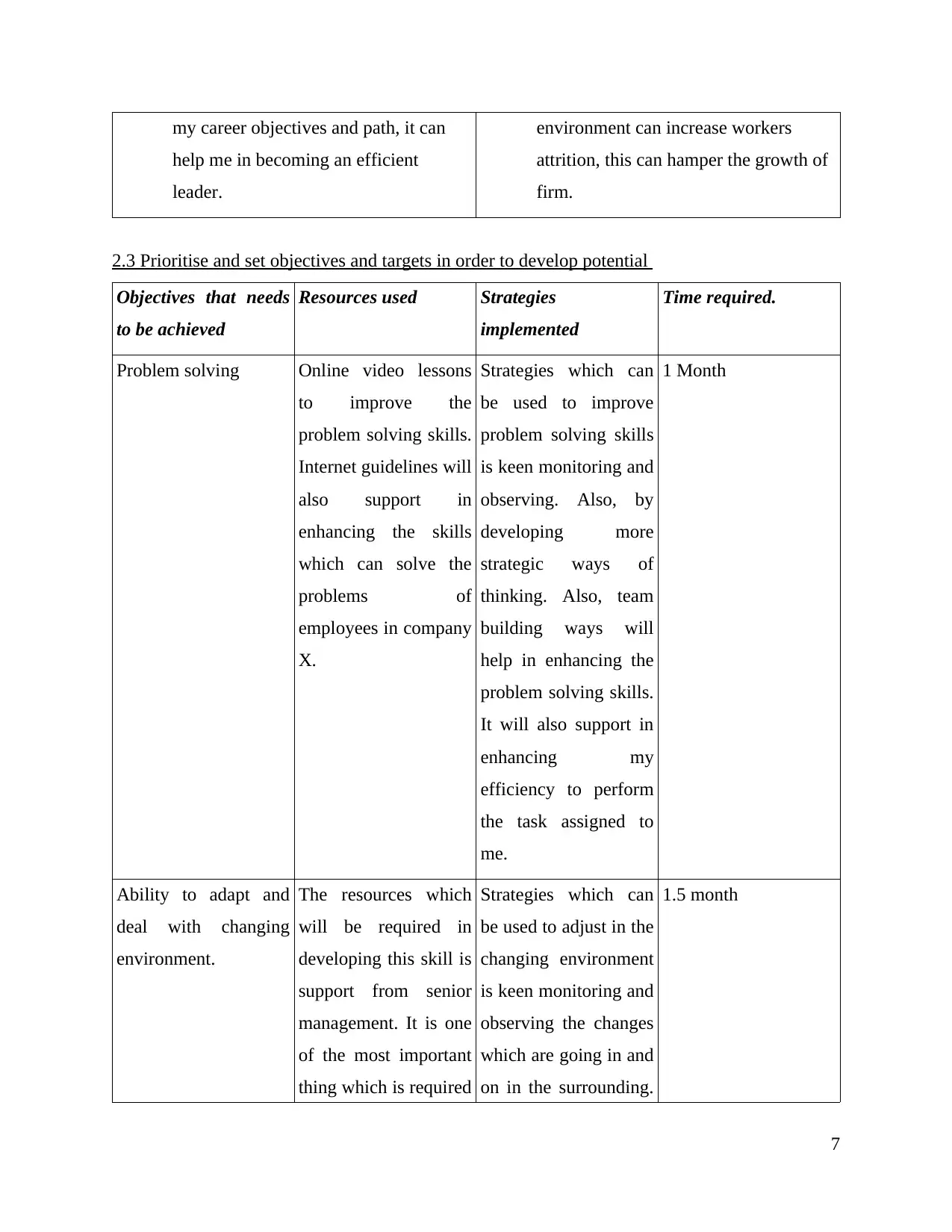
my career objectives and path, it can
help me in becoming an efficient
leader.
environment can increase workers
attrition, this can hamper the growth of
firm.
2.3 Prioritise and set objectives and targets in order to develop potential
Objectives that needs
to be achieved
Resources used Strategies
implemented
Time required.
Problem solving Online video lessons
to improve the
problem solving skills.
Internet guidelines will
also support in
enhancing the skills
which can solve the
problems of
employees in company
X.
Strategies which can
be used to improve
problem solving skills
is keen monitoring and
observing. Also, by
developing more
strategic ways of
thinking. Also, team
building ways will
help in enhancing the
problem solving skills.
It will also support in
enhancing my
efficiency to perform
the task assigned to
me.
1 Month
Ability to adapt and
deal with changing
environment.
The resources which
will be required in
developing this skill is
support from senior
management. It is one
of the most important
thing which is required
Strategies which can
be used to adjust in the
changing environment
is keen monitoring and
observing the changes
which are going in and
on in the surrounding.
1.5 month
7
help me in becoming an efficient
leader.
environment can increase workers
attrition, this can hamper the growth of
firm.
2.3 Prioritise and set objectives and targets in order to develop potential
Objectives that needs
to be achieved
Resources used Strategies
implemented
Time required.
Problem solving Online video lessons
to improve the
problem solving skills.
Internet guidelines will
also support in
enhancing the skills
which can solve the
problems of
employees in company
X.
Strategies which can
be used to improve
problem solving skills
is keen monitoring and
observing. Also, by
developing more
strategic ways of
thinking. Also, team
building ways will
help in enhancing the
problem solving skills.
It will also support in
enhancing my
efficiency to perform
the task assigned to
me.
1 Month
Ability to adapt and
deal with changing
environment.
The resources which
will be required in
developing this skill is
support from senior
management. It is one
of the most important
thing which is required
Strategies which can
be used to adjust in the
changing environment
is keen monitoring and
observing the changes
which are going in and
on in the surrounding.
1.5 month
7
⊘ This is a preview!⊘
Do you want full access?
Subscribe today to unlock all pages.

Trusted by 1+ million students worldwide
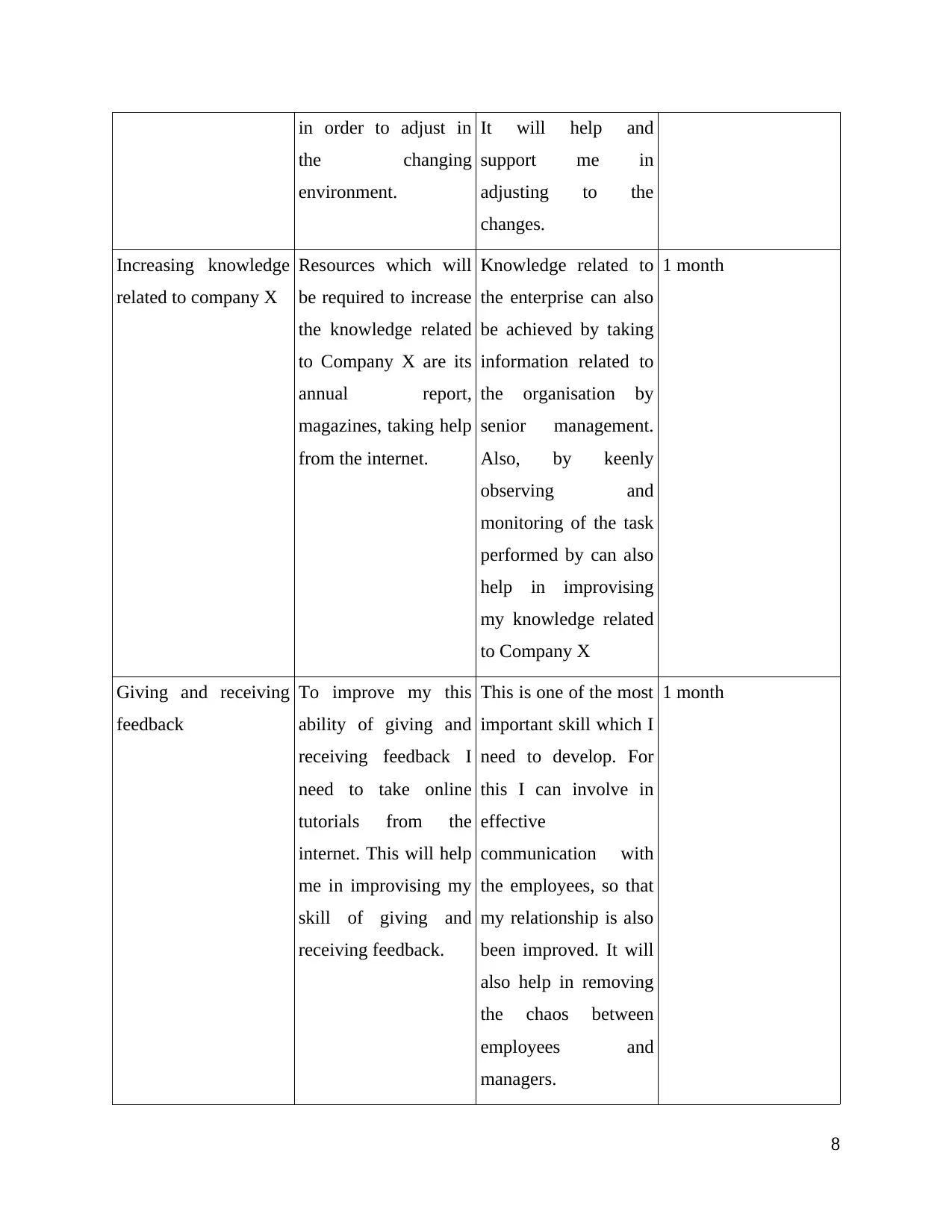
in order to adjust in
the changing
environment.
It will help and
support me in
adjusting to the
changes.
Increasing knowledge
related to company X
Resources which will
be required to increase
the knowledge related
to Company X are its
annual report,
magazines, taking help
from the internet.
Knowledge related to
the enterprise can also
be achieved by taking
information related to
the organisation by
senior management.
Also, by keenly
observing and
monitoring of the task
performed by can also
help in improvising
my knowledge related
to Company X
1 month
Giving and receiving
feedback
To improve my this
ability of giving and
receiving feedback I
need to take online
tutorials from the
internet. This will help
me in improvising my
skill of giving and
receiving feedback.
This is one of the most
important skill which I
need to develop. For
this I can involve in
effective
communication with
the employees, so that
my relationship is also
been improved. It will
also help in removing
the chaos between
employees and
managers.
1 month
8
the changing
environment.
It will help and
support me in
adjusting to the
changes.
Increasing knowledge
related to company X
Resources which will
be required to increase
the knowledge related
to Company X are its
annual report,
magazines, taking help
from the internet.
Knowledge related to
the enterprise can also
be achieved by taking
information related to
the organisation by
senior management.
Also, by keenly
observing and
monitoring of the task
performed by can also
help in improvising
my knowledge related
to Company X
1 month
Giving and receiving
feedback
To improve my this
ability of giving and
receiving feedback I
need to take online
tutorials from the
internet. This will help
me in improvising my
skill of giving and
receiving feedback.
This is one of the most
important skill which I
need to develop. For
this I can involve in
effective
communication with
the employees, so that
my relationship is also
been improved. It will
also help in removing
the chaos between
employees and
managers.
1 month
8
Paraphrase This Document
Need a fresh take? Get an instant paraphrase of this document with our AI Paraphraser
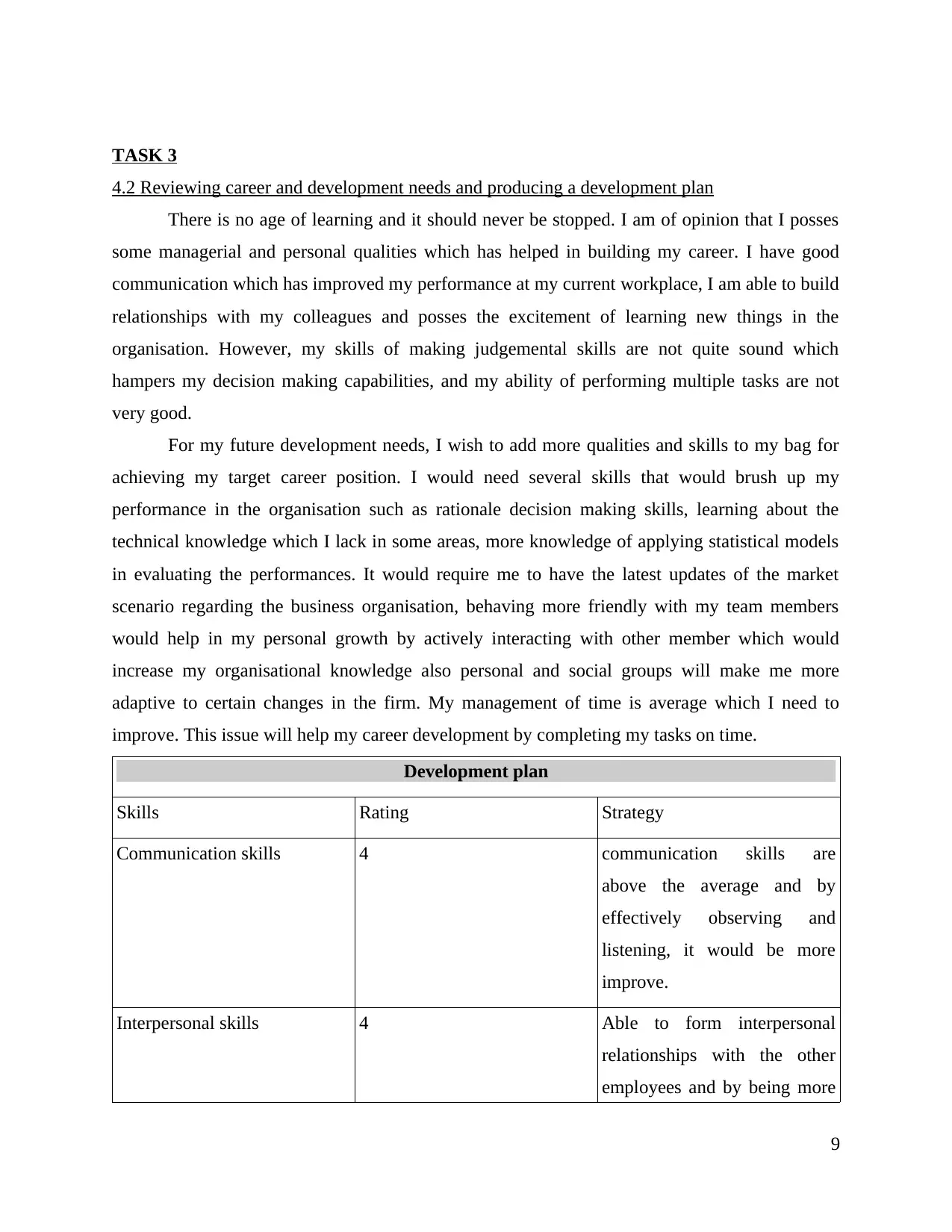
TASK 3
4.2 Reviewing career and development needs and producing a development plan
There is no age of learning and it should never be stopped. I am of opinion that I posses
some managerial and personal qualities which has helped in building my career. I have good
communication which has improved my performance at my current workplace, I am able to build
relationships with my colleagues and posses the excitement of learning new things in the
organisation. However, my skills of making judgemental skills are not quite sound which
hampers my decision making capabilities, and my ability of performing multiple tasks are not
very good.
For my future development needs, I wish to add more qualities and skills to my bag for
achieving my target career position. I would need several skills that would brush up my
performance in the organisation such as rationale decision making skills, learning about the
technical knowledge which I lack in some areas, more knowledge of applying statistical models
in evaluating the performances. It would require me to have the latest updates of the market
scenario regarding the business organisation, behaving more friendly with my team members
would help in my personal growth by actively interacting with other member which would
increase my organisational knowledge also personal and social groups will make me more
adaptive to certain changes in the firm. My management of time is average which I need to
improve. This issue will help my career development by completing my tasks on time.
Development plan
Skills Rating Strategy
Communication skills 4 communication skills are
above the average and by
effectively observing and
listening, it would be more
improve.
Interpersonal skills 4 Able to form interpersonal
relationships with the other
employees and by being more
9
4.2 Reviewing career and development needs and producing a development plan
There is no age of learning and it should never be stopped. I am of opinion that I posses
some managerial and personal qualities which has helped in building my career. I have good
communication which has improved my performance at my current workplace, I am able to build
relationships with my colleagues and posses the excitement of learning new things in the
organisation. However, my skills of making judgemental skills are not quite sound which
hampers my decision making capabilities, and my ability of performing multiple tasks are not
very good.
For my future development needs, I wish to add more qualities and skills to my bag for
achieving my target career position. I would need several skills that would brush up my
performance in the organisation such as rationale decision making skills, learning about the
technical knowledge which I lack in some areas, more knowledge of applying statistical models
in evaluating the performances. It would require me to have the latest updates of the market
scenario regarding the business organisation, behaving more friendly with my team members
would help in my personal growth by actively interacting with other member which would
increase my organisational knowledge also personal and social groups will make me more
adaptive to certain changes in the firm. My management of time is average which I need to
improve. This issue will help my career development by completing my tasks on time.
Development plan
Skills Rating Strategy
Communication skills 4 communication skills are
above the average and by
effectively observing and
listening, it would be more
improve.
Interpersonal skills 4 Able to form interpersonal
relationships with the other
employees and by being more
9
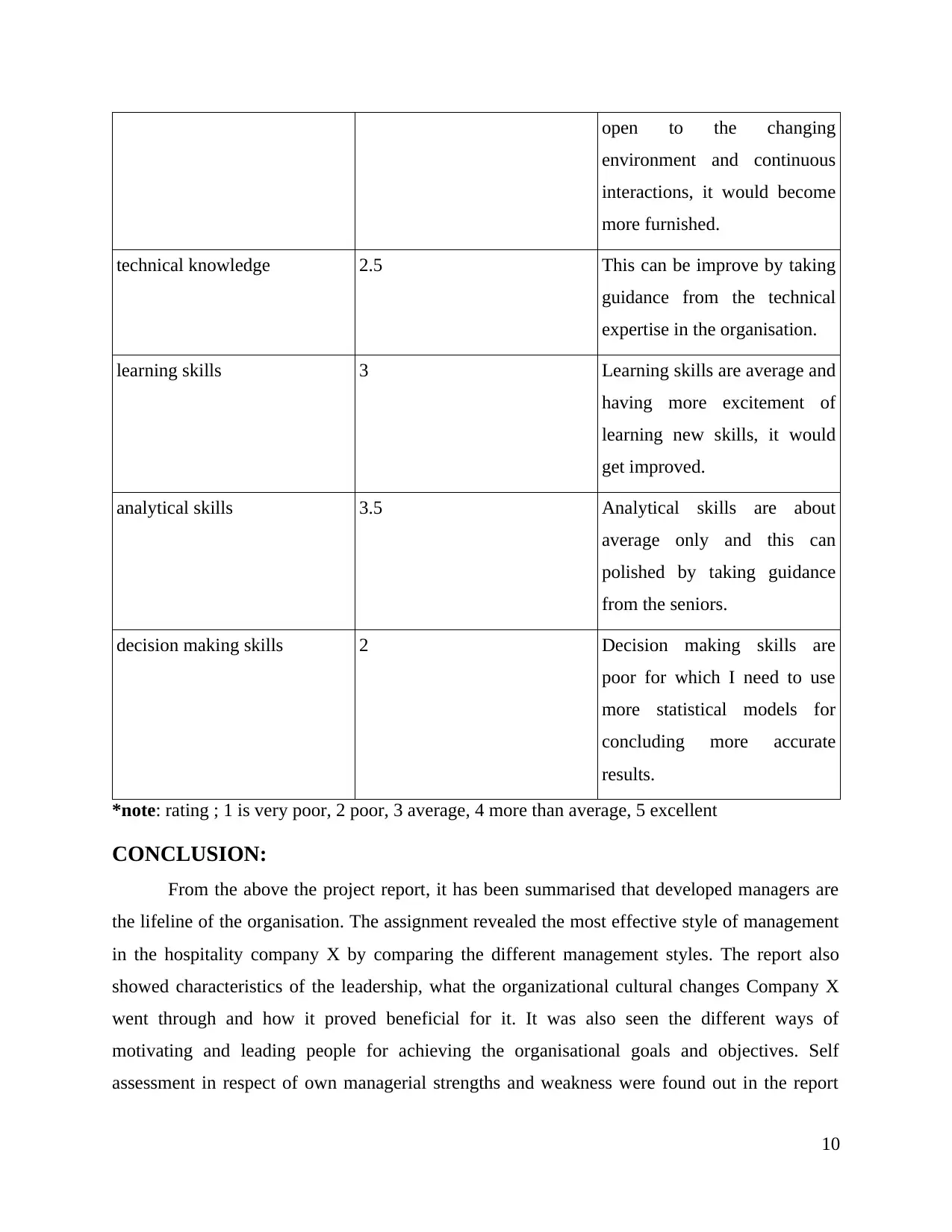
open to the changing
environment and continuous
interactions, it would become
more furnished.
technical knowledge 2.5 This can be improve by taking
guidance from the technical
expertise in the organisation.
learning skills 3 Learning skills are average and
having more excitement of
learning new skills, it would
get improved.
analytical skills 3.5 Analytical skills are about
average only and this can
polished by taking guidance
from the seniors.
decision making skills 2 Decision making skills are
poor for which I need to use
more statistical models for
concluding more accurate
results.
*note: rating ; 1 is very poor, 2 poor, 3 average, 4 more than average, 5 excellent
CONCLUSION:
From the above the project report, it has been summarised that developed managers are
the lifeline of the organisation. The assignment revealed the most effective style of management
in the hospitality company X by comparing the different management styles. The report also
showed characteristics of the leadership, what the organizational cultural changes Company X
went through and how it proved beneficial for it. It was also seen the different ways of
motivating and leading people for achieving the organisational goals and objectives. Self
assessment in respect of own managerial strengths and weakness were found out in the report
10
environment and continuous
interactions, it would become
more furnished.
technical knowledge 2.5 This can be improve by taking
guidance from the technical
expertise in the organisation.
learning skills 3 Learning skills are average and
having more excitement of
learning new skills, it would
get improved.
analytical skills 3.5 Analytical skills are about
average only and this can
polished by taking guidance
from the seniors.
decision making skills 2 Decision making skills are
poor for which I need to use
more statistical models for
concluding more accurate
results.
*note: rating ; 1 is very poor, 2 poor, 3 average, 4 more than average, 5 excellent
CONCLUSION:
From the above the project report, it has been summarised that developed managers are
the lifeline of the organisation. The assignment revealed the most effective style of management
in the hospitality company X by comparing the different management styles. The report also
showed characteristics of the leadership, what the organizational cultural changes Company X
went through and how it proved beneficial for it. It was also seen the different ways of
motivating and leading people for achieving the organisational goals and objectives. Self
assessment in respect of own managerial strengths and weakness were found out in the report
10
⊘ This is a preview!⊘
Do you want full access?
Subscribe today to unlock all pages.

Trusted by 1+ million students worldwide
1 out of 13
Related Documents
Your All-in-One AI-Powered Toolkit for Academic Success.
+13062052269
info@desklib.com
Available 24*7 on WhatsApp / Email
![[object Object]](/_next/static/media/star-bottom.7253800d.svg)
Unlock your academic potential
Copyright © 2020–2026 A2Z Services. All Rights Reserved. Developed and managed by ZUCOL.





